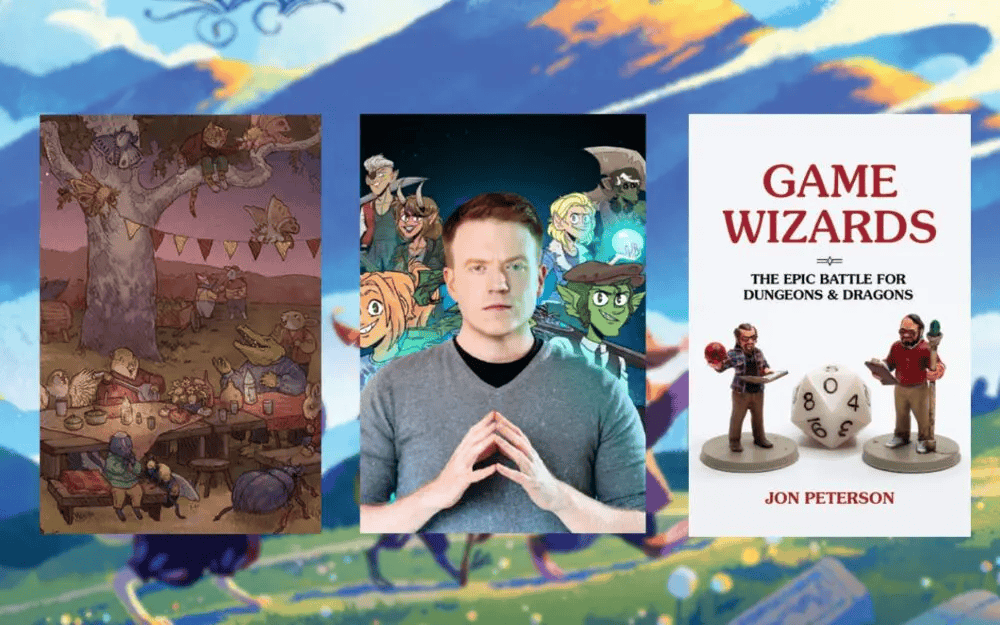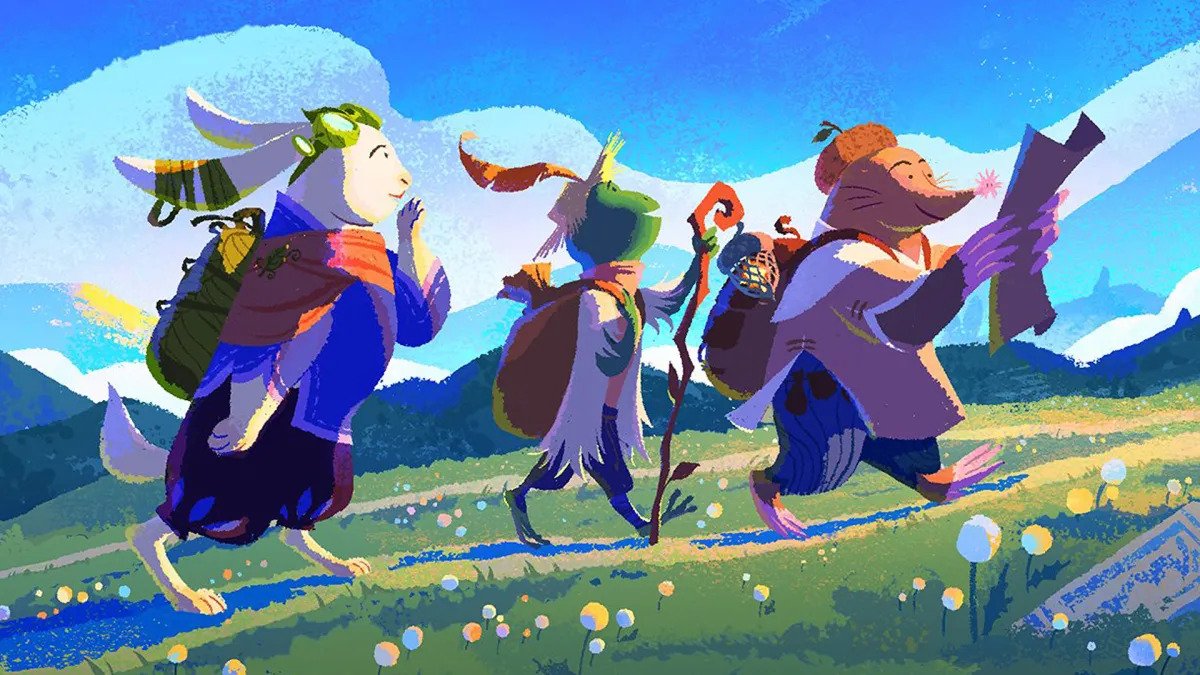The Back-Breaking Labor of TTRPGs
You have no idea how much this image haunts me.
During the pandemic,
I was one of two producers on Town Square with Ernie Manouse. It was a period of rapid development in show research, scriptwriting, and studying Ernie’s interviewing style. A brand new live talk show, five days a week, on the most pressing issues impacting our listeners, and I loved it.
The show was created as a live talk show in direct response to the pandemic. Its first year was primarily dedicated to answering questions about COVID-19. Absolutely everything COVID-19 touched, from pathology and sociology to economics, was tackled by our host.
We spent hours each week ensuring our content was as accurate and valuable to listeners as possible. The experience also gave me a chance to experiment with a different format from Houston Matters, a news magazine show, to an hour-long talk show. It allowed us to take deep dives into groundbreaking and socially relevant topics.
A year in, the show began exploring broader, national conversations from social issues like Black Lives Matter, to lighthearted topics such as the best pizza places in Greater Houston. I evolved, too. My work expanded to include my first-ever stint as a host after our regular host was called away at the last minute. Luckily for me, the topic was something I’d often thought about even before I pitched it:
Latinos Still Fight The Same Barriers For Authentic Representation
But two years in, I had to admit I was burning out. No vacations, little social life, and a constant obsession with the latest headlines were taking their toll.
Around that time, News 88.7 needed another board operator for the midday and weekend shifts, and I was approached because of my “radio broadcast voice.”
Which you can hire me to use. Jus’ sayin’.
I hesitated to take the new position. As stressed as I was, being one of only three producers on the show, and the opportunity promised new skills and experiences, it would also pull me away from the fast-paced world of shaping media.
After some discussion, a compromise emerged: I would work as a board op and announcer during the midday and weekend shifts while continuing to produce one-hour Town Square episodes to air during breaks or special segments.
Dear Reader, I was ecstatic.
It was the best of both worlds. A lighter mental load while running the board, yet my thumb was still on the pulse of media coverage. Because the episodes were planned weeks in advance, I could carefully design and experiment with topics I normally wouldn’t have time to explore - subcultures, true crime, and media that rarely got airtime at the station.
Around this time, I started watching Dimension 20 and was surprised by how much it helped ease my pandemic stress. Social distancing had paused my improv performances, comedy shows, and in-person gatherings, so most of my social life moved online — often with friends playing Dungeons & Dragons and other tabletop RPGs.
Tabletop games rekindled the creativity, improv, storytelling, and problem-solving I’d missed since the pandemic began. Many of my peers felt the same; millennials caught between responsibility and the need for genuine connection amid constant uncertainty. These games filled that gap, offering a world where we could live beyond vaccine debates and daily anxiety.
I was fascinated by how TTRPGs mirror real-world drama and unpredictability, so I decided to dedicate a full episode to them. I set out to explore them in three angles: the history of Dungeons & Dragons, the craft of game mastering, and the creativity behind indie game development. To my surprise, Brennan Lee Mulligan, the host of Dimension 20, responded quickly and enthusiastically. Jon Peterson, author of Game Wizards, and Jay Dragon, an award-winning indie designer, also agreed to join.
For my first fully self-produced and hosted episode, it was shaping up to be a surprisingly manageable dream come true. Sure, it had been a while since I produced multiple segments as the interviewer, but I figured it would work out. After all, I’d been studying one of the best interviewers in Houston. It would be fine.
And that’s when I rolled a Nat 1.
Not even the cozy world of Wanderhome could comfort this weirdo.
Hubris is funny that way, isn’t it?
The day before my big interview with Brennan, I had a fall.
Note, I didn’t say, “I fell.” I said, “I had a fall.” I’m now at an age where that phrasing feels painfully appropriate. And in that fall, I cracked my ribs and my spine. Oh, I cried. Like a baby, I cried. I could barely move, and even breathing hurt.
Yet, despite all reason, I decided not to cancel the interview. Instead, I strapped on a giant medical corset, grabbed a walker, refused pain medication so I could stay sharp, and toddled my way into a brand-new remote recording studio to interview Mr. Brennan Lee Mulligan himself.
Y’all-
If my interview with Sandra Cisneros was a dream come true, this one with Mr. “I-Cannot-Win” was a nightmare.
Technical issues gave Brennan a delayed echo every time he spoke, and like a true professional, he powered through. He was friendly, funny, and eager to answer listener questions. A top-tier guest. A twenty-sided gem. Cannot recommend enough.
Me, however? Have you ever had one of those out-of-body moments where you watch yourself bombing a party conversation - cornering some poor soul and rambling about your sciatica or something you know you shouldn’t be talking about?
That was me. Only with dice and dragons. The pain and anxiety of the interview had scrambled my brain.
To make matters worse, Brennan had a strict time limit — and my fire spine and scripted question-adled brain missed the cue, leaving him on far too long. Every rookie mistake I could’ve made, I made. No denying it.
When it was over, I went home, laid my broken back in bed, and stared at the ceiling, wondering if I even had a career anymore. That’s how brutal it felt. For months afterward, I couldn’t bring myself to watch anything related to TTRPGs. I’d flinch just picturing Brennan, too polite and professional to tell me I made him late as hell.
The other interviews went… fine. Not bad, not great. But something in me had been shaken loose. I felt it with every agonizing minute of editing: the connections felt forced, the research disjointed. The invisible thread of storytelling that usually ties everything together was either too slack or too tight in my hands.
A great interviewer guides the conversation. They challenge and hold their guests while still respecting them, and shape a narrative that informs and, if they’re lucky, delights the audience. I didn’t feel like I did any of that. Worst of all, it was on a topic that had brought me, and so many others, comfort when we needed it most.
It’s this episode I return to whenever I’m reminded that loving a topic isn’t enough to make a good episode.
The strangest part is that, over the years, I’ve received feedback from listeners who couldn’t tell. They don’t hear the stress in my voice or the odd audio clip. They don’t hear the low rumble of “You’re not good enough” beneath the mix, even if I’m convinced I can.
And hey- I did it! Despite my reservations and my pain, both physical and mental, I made it happen. I pitched, researched, scripted, emailed, called, scheduled, interviewed, troubleshot, edited audio and photos, and wrote the article to post it all. All the while berating myself for being in pain.
Except now, I can’t listen to it. I can’t reflect on the work I created, knowing so clearly what I should have done differently.
Spite is funny that way, isn’t it?
So why is this episode on my website? Because it carries a hard-earned lesson I share with every new media producer and interviewer:
Heed me — listen to your body, especially when you don’t want to.
The entire time my back was screaming at me to stop, I kept saying I had interviews and deadlines to meet. And I did, to the detriment of my guests, my listeners, and myself. I lost opportunities because the pain became unbearable. Rescheduling was impossible, and canceling felt like failure.
In the end, it wasn’t dedication that pushed me through; it was pride. I should have listened to my body. I should have spoken to my team and mentors about where my pain and headspace truly were.
It took time, but I can enjoy the games again. I meet with friends to play. I’m even part of a campaign where my friend’s young son, eyes wide with excitement, tells me about all the languages his druid gnome can speak before defeating their foes. And yes, I can even watch Dimension 20 again.
Mostly.
People in the media often joke about “feeding the beast”, the endless need for new content. And while it’s true we should strive to do our best, to seek out new angles and conversations that help audiences better understand their world, it’s not our job to be the meal.
You can listen to the episode here,(if you dare):
Tabletop role-playing games play on the heart
Guests:
Brennan Lee Mulligan
Creator and host of Dimension 20 on Dropout
Guest host on Critical Role‘s miniseries, Exandria Unlimited: Calamity
Creative Director and head publisher at Possum Creek Games
Creator of Wanderhome and Yazeba’s Bed & Breakfast
Town Square with Ernie Manouse - Houston Public Media




